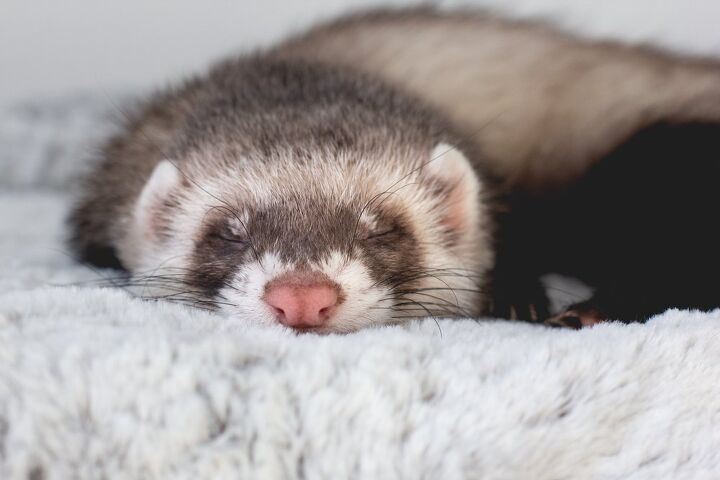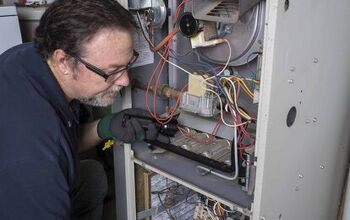House Smells Like Ferret? (Possible Causes & Fixes)

Ferrets are cute little animals, but they produce a musky odor that some people find unpleasant. If you keep a ferret in your house as a pet, the entire space could have a strong odor, especially if you fail to keep its cage clean. Failure to wash the animal and its litter box and bedding could also contribute to the musky smell in your house.
Ferrets are the domesticated species of the European polecat. These small animals are known for the distinctive musky odor they produce. The odor is produced either by their anal glands or skin. The body scent produced by ferrets is secreted all over their skin in the form of oil. When these animals are in heat, the odor tends to be more intense.
The odor that ferrets produce in their anal glands is rarer but even more unpleasant. According to zoologists, body odor is a defense mechanism against the ferret’s predators. Whenever the animals get scared, they release stink bombs to deter potential predators.
The animals also use this distinctive odor to mark their territory, especially in the wild. The ferret’s anal odor is produced by tiny scent sacs located in the anal region. Although getting rid of the ferret odor is difficult, it isn’t impossible.
Do You Need Carpet Cleaning Services?
Get free, zero-commitment quotes from pro contractors near you.

How to Reduce or Eliminate Ferret Odor
We all want to live in clean and odorless homes. However, this can be a challenge if you keep a ferret or the animals live in the neighborhood. To keep your home from stinking up, it’s best to nip this problem in the bud. So, here’s how you can reduce or eliminate the ferret odor:
Ferret-Proof Your House
If ferrets heavily populate your locality, there’s a high chance that they will find a way into your house. If your house smells like a ferret, yet you don’t keep the animals, the chances are that they often sneak into your house and leave the scent behind.
Most ferrets are the domesticated type, but the black-footed ferrets are the wild species. They can find their way into your house if you live in an area they populate. Here’s what you can do to keep them off your property:
- Seal Holes And Gaps Around The Property
The black-footed ferret can slip into small gaps and enter your house. Sealing these gaps will help prevent the entry of these animals into your house.
- Avoid Feeding Them
Ferrets could sneak into your home because they find food to eat. In the process, they leave their characteristic odor behind. Avoid feeding the animals unwittingly by covering garbage cans, besides ensuring there’s no food lying around the house.
- Get Rid of Potential Habitats
You can discourage ferrets from sneaking into your home by getting rid of potential habitats. These include old furniture, woodpiles, and clothes, since these provide the perfect habitats and hiding place, especially for the black-footed ferrets.
Keep Your Ferrets Clean
Like other small animals, ferrets can get messy pretty quickly, and with this comes the unpleasant body odor. Start by bathing your ferret once every month. Frequent baths can also be detrimental, since water washes away oil from the animal’s skin. The body will produce more oil to replace the stripped-away oil, thus worsening the smell.
The most effective way to bathe a ferret is by filling a basin/tub with warm water before submerging the animal in the water. Ensure that your ferret’s head is kept above the water, and scrub its body with a shampoo recommended by vets.
Avoid using human shampoos or conditioners on your ferret because they contain chemicals that might irritate your fuzzy friend. After washing the animal, use a towel to wipe the water off its body gently. Unless your ferret is excessively dirty, avoid washing it once a month.
If you find your ferret’s scent to be stronger than usual, avoid the temptation of using cleansers or deodorizers when washing it. De-scenting a ferret does little to mask its natural odor and can even cause allergic reactions.
Regular Ear Cleaning
Cleaning your ferret’s ears regularly can also help with the odor. The proper way to do so is by pouring a recommended ear cleaning solution into a bowl. After that, dip a cotton swab into the solution before rubbing it along the ferret’s outer ear.
After cleaning the outer ear, move the cotton swab gently into the ear while rotating it to remove wax and the oil that causes these animals to smell unpleasant. Always remember to replace the cotton swab whenever it gets dirty to push wax deeper into the ear.
When cleaning a ferret’s inner ear, ensure you can see part of the cotton swab. Otherwise, there’s the risk of going in too deep, thus damaging the animal’s delicate inner ear parts.
Neuter Your Ferret
Ferret odor among females tends to get even more unpleasant when they are in heat. To prevent the hormones from going into overdrive when the animals reach maturity, it’s best to neuter them. In doing so, you’ll be reducing their potential to produce a strong odor.
Typically, female ferrets stay on heat till they mate, which comes with the risk of anemia. You can prevent this by neutering the females. Conversely, neutering male ferrets comes with the risk of adrenal gland disease. Thus, it’s best to consult a vet first before neutering your ferrets.
Train Your Ferrets to Use their Litter Boxes
Ferret’s feces and urine also have the musky smell associated with these animals. Training the animals to use their litter boxes will make it easier for you to eliminate their waste and the musky odor from your house.
Start by placing the litter box in the same place, then pick a few of your ferret’s droppings before placing them in the litter box. Once a ferret discovers that the litter box resembles its smell, it will start to use the litter box. Just like cats, it’s relatively easy to train a ferret on new pooping habits.
Once your ferret gets used to pooping in the litter box, ensure you keep it clean at all times. The animal’s droppings also have a pungent odor, hence the need to get rid of the droppings at least twice every day. Don’t allow the dropping to pile since the animal will start digging and scatter the litter everywhere.
Clean the Ferret’s Habitat
The American Ferret Association opines that the animal’s musky odor will automatically get transferred to their habitats. Washing and replacing their sleeping sacks, hammocks, and washable toys with clean items will go a long way in making your home odorless.
When washing your ferret’s bedding and toys, it’s best to remember that scented dryer sheets and detergents can be used. However, we only use products recommended by vets to prevent irritation. Providing clean items for your ferret at all times not only reduces the odor in its cage but also helps to guarantee its health.
Your ferret’s cage should also be cleaned weekly. Start by removing the litter box, toys, bedding, and any other items in the cage, then take it outside. Use warm water and ordinary soap, scrub down the cage, and dry it in the sun.
When cleaning the cage, ensure you also get rid of stale food and any other debris. Metal cages are an excellent option for ferret owners compared to wooden ones. It’s easier to clean metal than wood. Keeping your ferret in its cage for as long as it’s possible goes a long way in minimizing ferret odor in your house.
The odor won’t be transferred to carpets, furniture, or even your clothes, since the animal will be in one place. If you allow it to run freely around your house, the odor will likely be everywhere, but keeping the animal caged will help you control the odor. Besides, consider installing an air filter inside your ferret’s cage.
Feed Your Ferret on a High-Quality Diet
The food you give to a ferret could be the difference between having a smelly and odorless home. Try feeding the animal lean meats such as chicken while cutting grains, fats, veggies, and fruits from its diet. This will go a long way in reducing the musky odor. Also, avoid fish because it makes ferrets’ poop even smellier.
Have the Scent Glands Removed
More people who keep ferrets in their homes are taking the surgical root to minimize the odor produced by these animals. Often, this happens in extreme cases where other methods have been experimented, but with minimal results.
Having the scent glands removed minimizes the scent produced by ferrets and eliminates the risk of the glands getting infected. Nevertheless, the procedure doesn’t eliminate the scent because most of it is produced by the animal’s skin. Though painful, de-scenting surgery is a common cosmetic procedure.
Do You Need Carpet Cleaning Services?
Get free, zero-commitment quotes from pro contractors near you.

Final Words
Ferrets are some of the most adorable pets you can keep at home. However, they can make your home unpleasant to live in, especially when they produce their characteristic musty smell. Therefore, it’s best to know how to eliminate the odor and also how to keep the wild black-footed ferrets off your property.

We are a team of passionate homeowners, home improvement pros, and DIY enthusiasts who enjoy sharing home improvement, housekeeping, decorating, and more with other homeowners! Whether you're looking for a step-by-step guide on fixing an appliance or the cost of installing a fence, we've here to help.
More by Upgraded Home Team
























![12 Washing Machine Brands to Avoid [with Recall Data]](https://cdn-fastly.upgradedhome.com/media/2023/07/31/9075781/12-washing-machine-brands-to-avoid-with-recall-data.jpg?size=350x220)


